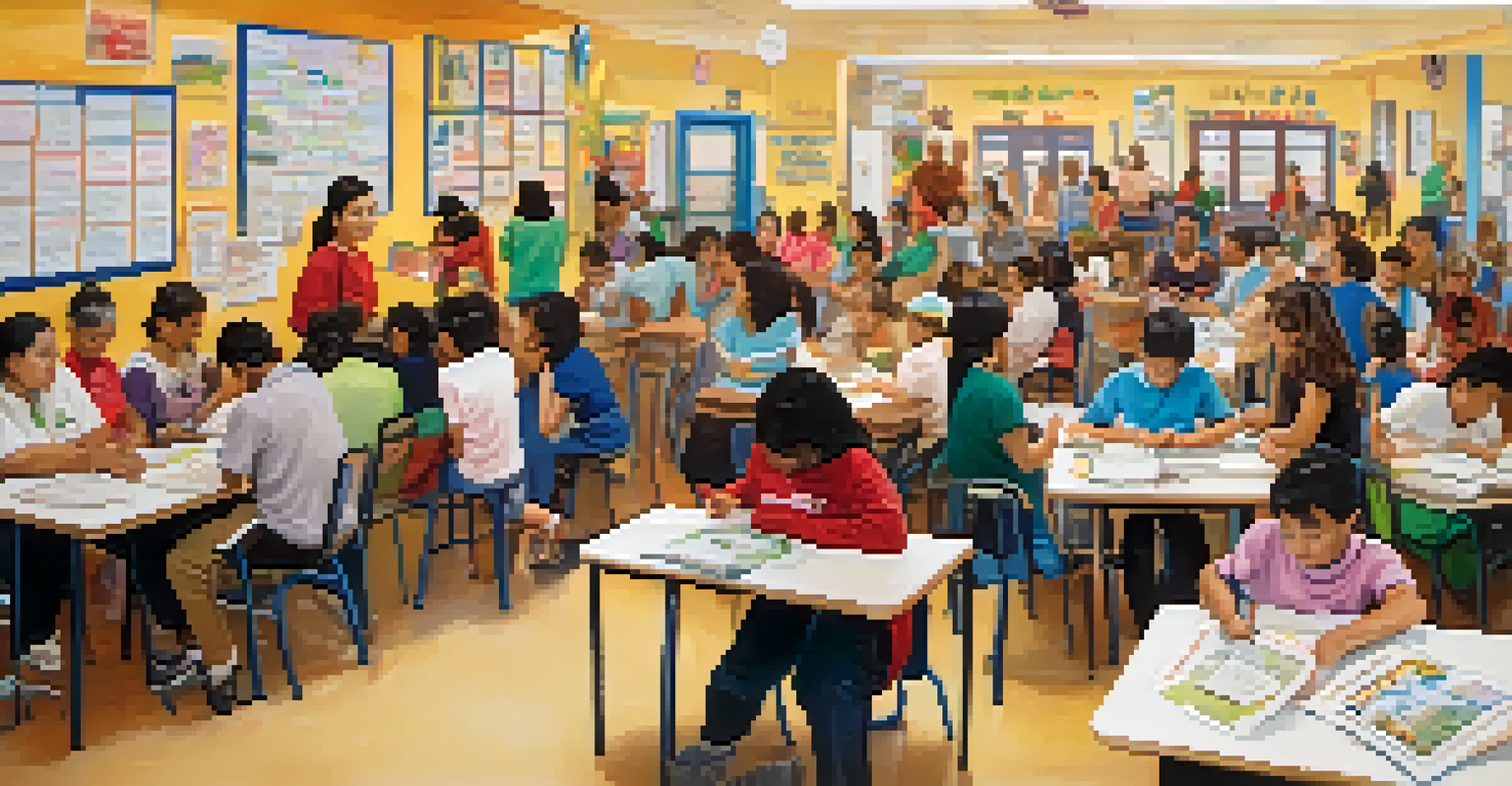Educational Opportunities for Immigrant Families in LA

Understanding the Unique Needs of Immigrant Families
Immigrant families often face unique challenges when it comes to education, such as language barriers and cultural differences. These obstacles can make it difficult for parents to navigate the school system and for children to adjust to a new educational environment. Understanding these needs is crucial for developing effective educational programs that truly support these families.
Education is the most powerful weapon which you can use to change the world.
For instance, many immigrant parents may not be familiar with the U.S. educational system, which can lead to confusion about enrollment processes, curriculum expectations, and available resources. Schools that actively engage with immigrant families can provide the necessary guidance to help them thrive. Building trust and communication is essential in this process.
Additionally, recognizing the cultural strengths of immigrant families can enhance the educational experience. Schools can benefit from incorporating diverse cultural perspectives, which enriches the learning environment for all students.
Language Support Programs for Students
Language support is a cornerstone of educational opportunities for immigrant families. Many schools in Los Angeles offer English as a Second Language (ESL) programs designed to help non-native speakers improve their language skills. These programs not only assist students academically but also help them feel more integrated into their new community.

For example, schools may provide bilingual education where subjects are taught in both English and the student's native language. This approach not only aids comprehension but also allows students to maintain their cultural identity. Engaging with the community through workshops can further bolster their language skills and confidence.
Support for Immigrant Families
Understanding the unique challenges faced by immigrant families in education is essential for creating effective support programs.
Parents can also benefit from language support initiatives. Many organizations offer free or low-cost ESL classes for adults, empowering them to communicate effectively with teachers and participate in their children's education.
Access to Community Resources and Programs
Los Angeles is home to numerous community organizations that provide resources tailored to immigrant families. These organizations often offer workshops, tutoring, and counseling services aimed at supporting educational success. By connecting with these resources, families can find the help they need to navigate challenges.
The beautiful thing about learning is that no one can take it away from you.
For instance, organizations like the Coalition for Humane Immigrant Rights (CHIRLA) provide legal assistance and educational workshops that can guide families through the complexities of immigration and education. Such support can make a significant difference in a family's ability to focus on their children's education.
Additionally, community centers often host after-school programs that offer homework help, enrichment activities, and mentorship, fostering a sense of belonging and community for immigrant students.
School District Initiatives for Inclusivity
Many school districts in Los Angeles have recognized the importance of inclusivity in education for immigrant families. Initiatives such as cultural competency training for teachers aim to create a supportive environment where all students feel valued. These programs focus on understanding diverse backgrounds and addressing biases in the classroom.
Schools are also increasing their outreach efforts to connect with immigrant families. This includes hosting informational sessions in various languages and creating materials that are accessible to non-English speakers. Such initiatives are vital in ensuring that parents are informed about their children's education.
Language Programs Enhance Integration
Language support initiatives, such as ESL programs, play a vital role in helping immigrant students and parents feel more integrated into their communities.
Furthermore, involving immigrant families in decision-making processes helps schools better understand their needs. This collaborative approach fosters a sense of community and encourages parental involvement, which is crucial for student success.
Higher Education Pathways for Immigrant Youth
As immigrant youth progress through their education, higher education opportunities become a key focus. Many organizations provide guidance on college applications, scholarships, and financial aid specifically for immigrant students. This support can help alleviate the financial burdens associated with higher education.
For example, programs like College Track offer comprehensive support to low-income and first-generation college students, including academic tutoring and mentorship. Such resources are invaluable for immigrant youth navigating the college landscape.
Moreover, understanding the nuances of the college admissions process, including how to highlight unique backgrounds and experiences, is essential. Workshops and one-on-one counseling can empower students to present their stories effectively.
Cultural and Extracurricular Enrichment Opportunities
Cultural and extracurricular activities play an important role in the education of immigrant families. Schools and community organizations often offer programs that celebrate diverse cultures, allowing students to share their heritage. This not only fosters pride but also builds bridges between different cultural groups.
Extracurricular activities, such as clubs and sports, provide students with the opportunity to engage with peers outside of the classroom. These activities can help build friendships and create a sense of belonging, which is particularly important for immigrant youth adjusting to a new environment.
Community Resources Foster Success
Access to community resources and programs can significantly aid immigrant families in navigating educational challenges and enhancing student success.
Additionally, participating in cultural events can enhance students' educational experiences. Events such as cultural fairs or international nights allow families to showcase their traditions and facilitate understanding among students and faculty.
The Role of Technology in Education Access
In today’s digital age, technology plays a crucial role in expanding educational opportunities for immigrant families. Online learning platforms and resources can provide additional support for students who may need extra help outside of school hours. This flexibility can be particularly beneficial for families adjusting to new schedules and language barriers.
Many organizations also offer digital literacy programs for parents, teaching them how to use technology effectively. This empowers families to engage more actively in their children's education, from accessing learning materials to communicating with teachers.

Moreover, technology can bridge gaps in language and culture. Online translation tools and language learning apps can enhance communication and learning experiences, making education more accessible for immigrant families.